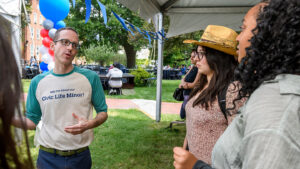Minor in Civic Life

An academic program enabling students in any field of study to meet the critical challenges of democracy.
What does it take for people to engage productively as informed, skilled, and effective members of democratic communities and the world?
Whether we are scientists, doctors, engineers, advocates, public servants, or anything else, we are all members of pluralistic communities. In all of these communities, people of all kinds need capacities to engage productively with one another, develop the skills to negotiate difference, and cooperate to achieve common goals.
The area of civic studies examines why such skills are foundational to making liberal democracy work in pluralistic societies, how such capacities can be nurtured, and the historical and contemporary struggles to realize these principles. It is an applied and interdisciplinary field, incorporating critical reflection, ethical thinking, empirical understanding, historical perspectives, and action for social change within and between societies.
The minor in civic life introduces students to civic studies through its core seminars, electives, and experiential learning opportunities. Students participating in the minor will join a vibrant community of student peers, faculty, and fellows at the SNF Agora Institute. Regardless of their primary area of undergraduate study, the minor in civic life empowers students to be engaged global citizens. As a minor, it is specifically intended to engage and equip students interested in pursuing any kind of career (including STEM careers) with the skills of critical inquiry and applied research they need.
Minor Requirements (17 Credits)
- AS.196.201 Introduction to Civic Life: 3 credits
- AS.196.320 Civic Life Seminar: 2 credits
- AS.196.420 Civic Life Capstone: 3 credits
- Three approved elective courses: 9 credits
Courses taken at another institution that are not directly equivalent to a JHU course may not apply towards the minor without permission from the director of undergraduate studies. All courses must be taken for letter grades and receive a grade of C-minus or higher.
More Information
For more information about the minor in civic life, please email Bryce Corrigan, director of undergraduate studies, at [email protected].
Featured Faculty
Minor in Civic Life Spring 2026 Approved Electives
| Course | Title & Description | Instructor(s) | Schedule | Credits |
|---|---|---|---|---|
| AS.196.210 |
CATASTROPHE
Study global risks such as authoritarianism, war, and climate change, and explore how democracies respond.
|
Yascha Mounk | — | 3 |
| AS.196.363 |
POPULISM AND POLITICS
Analyze the causes and consequences of populism around the world.
|
Yascha Mounk | Tuesday | 3 |
| AS.196.325 |
AI AND DEMOCRACY
Investigate how artificial intelligence shapes democratic institutions and public decision-making.
|
Henry Farrell | Thursday | 3 |
| AS.100.433 |
FREE SPEECH AND CENSORSHIP IN THE UNITED STATES
Explore the history and law of free expression and debate in American democracy.
|
Peter Jelavich | Wednesday | 3 |
| AS.110.303 |
THE MATHEMATICS OF POLITICS, DEMOCRACY, AND SOCIAL CHOICE
Apply mathematical models to questions of voting, representation, and fairness.
|
Christopher Ratigan | Online | 4 |
| AS.280.314 |
TRUTH, EVIDENCE, AND INFLUENCE: CASE STUDIES IN PUBLIC HEALTH
Study how evidence, communication, and trust shape public health decisions.
|
Maria Bulzacchelli Moira Cahan |
Tue/Thu | 3 |
| AS.230.220 |
POLARIZED COLLEGE STUDENTS: INTERVIEWING ACROSS THE DIVIDE
—
|
Amy Binder | Monday | 3 |
| AS.190.358 |
LIBERAL EDUCATION: A CONTESTED QUESTION
—
|
Robbie Shilliam Benjamin Storey |
Tuesday | 3 |
Important: Check SIS for the most current listings for Spring 2026. Search for courses with the Program of Study tag: AGRI-ELECT
All courses must be taken for a letter grade with a C-minus or higher to count toward the Minor in Civic Life.
Approved Electives for the Minor in Civic Life
Program of Study: AGRI-ELECT
| Course Number | Course Title |
|---|---|
| SNF Agora Institute Courses | |
| AS.196.210 | Catastrophe |
| AS.196.301 | Social Entrepreneurship and Democratic Erosion |
| AS.196.302 | Science and Democracy |
| AS.196.304 | Democratic Challenges |
| AS.196.305 | Democratic Erosion |
| AS.196.306 | Democracy by the Numbers |
| AS.196.308 | Voting Power: How to Win Policy Reform in The U.S. Election Ecosystem |
| AS.196.309 | Digital Resilience: How to Protect Vulnerable Groups from Mis- and Disinformation |
| AS.196.310 | Fighting the Information War: Democracy, Autocracy, and the Battle of Narratives in the 20th and 21st Centuries |
| AS.196.311 | Democracy |
| AS.196.312 | Citizenship in the Digital Age |
| AS.196.313 | That Which Cannot be Said: A Course Through Our Divisions |
| AS.196.314 | Theatre, Civics, and Political Discourse: Exploring Governance through Performance |
| AS.196.325 | AI and Democracy |
| AS.196.326 | How to Beat Autocrats: lessons from the front lines in the battles to defend democracies |
| AS.196.363 | Populism and Politics |
| AS.196.364 | This is Not Propaganda |
| AS.196.435 | Democratic Strategies in an Age of Information Conflict |
| Writing Seminars | |
| AS.004.101 | Reintroduction to Writing: The Cost of Free Speech |
| AS.004.241 | Special Topics in Writing: Politics and Persuasion |
| AS.004.241 | Special Topics in Writing: Future of Holocaust Memory |
| History | |
| AS.100.119 | Introduction to U.S. Immigration History and Law |
| AS.100.190 | Modern African American History, 1896 – present |
| AS.100.244 | U.S. Conservatism |
| AS.100.271 | Documenting & Digitizing Black Louisiana: Sources, Tools and Contexts |
| AS.100.307 | Research Seminar: The American Elections |
| AS.100.345 | Right-wing populism since the 1980s |
| AS.100.406 | Public History and Engaged Research |
| AS.100.411 | AI and Data Methods in History |
| AS.100.433 | Free Speech and Censorship in the United States |
| AS.100.434 | The Modern American Presidential Election in Historical Perspective |
| AS.100.450 | History Research Lab: Discovering Hard Histories at Hopkins |
| AS.100.453 | Global Legal History |
| Mathematics | |
| AS.001.184 | FYS: The Mathematics of Politics, Democracy, and Social Choice |
| AS.110.303 | The Mathematics of Politics, Democracy, and Social Choice |
| EN.553.335 | Mathematics for a Better World |
| Philosophy | |
| AS.150.220 | Introduction to Moral Philosophy |
| AS.150.257 | Philosophy and Democracy |
| AS.150.313 | Technology, Democracy, and Social Justice |
| Political Science | |
| AS.190.101 | Introduction to American Politics |
| AS.190.102 | Introduction to Comparative Politics |
| AS.190.108 | Contemporary International Politics |
| AS.190.254 | Democratic Political Theory |
| AS.190.286 | Liberalism, Republicanism, and Democracy in American Political Theory |
| AS.190.319 | Policy and Politics Design |
| AS.190.322 | Future of American Democracy |
| AS.190.333 | American Constitutional Law |
| AS.190.353 | China and the World |
| AS.190.358 | Liberal Education: A Contested Question |
| AS.190.366 | Free Speech and the Law in Comparative Perspective |
| AS.190.374 | Political Violence |
| AS.190.375 | Thinking Organizationally about Politics |
| AS.190.378 | The U.S. Supreme Court and Social Movements |
| AS.190.393 | Nonviolent Resistance in World Politics |
| AS.190.420 | From Polycrisis to Polytunity |
| AS.190.437 | Race and Ethnic Politics in the United States |
| AS.190.444 | Comparative Politics |
| AS.190.473 | Political Polarization |
| AS.190.480 | Democracy and Institutional Anxiety across the Political Spectrum |
| AS.191.233 | Collective Action and Organization Strategy in the U.S. |
| AS.191.333 | Dictatorship, Dissidence, and Democracy: Central Europe in the 20th Century |
| AS.192.290 | Informational World Orders |
| Economics | |
| AS.197.101 | Social Theories of the Economy I |
| AS.197.102 | Social Theories of the Economy II |
| AS.197.208 | Civilization on Trial: The Grand Discourse on Modernity |
| AS.197.210 | Global Capitalism |
| AS.197.211 | City, Country, Inequality: The Political Economy of Place in the U.S. |
| AS.197.212 | Reading Seminar: Who Cares? The Political Economy and Social Policy of US Gender Inequality |
| AS.197.250 | Competition, Conflict, and Coordination: Microeconomics and Political Economy |
| AS.197.308 | Follow the Money: Crime Media, Surveillance, and Policing in the U.S. |
| AS.197.309 | Bureaucracy, From the Deep State to the DMV |
| AS.197.327 | People, Power, and Pay: The Economics of the Workplace |
| AS.197.330 | Social Networks (Research Lab) |
| Psychology | |
| AS.200.219 | Introduction to Political Psychology |
| AS.200.238 | Primate Minds |
| AS.200.337 | Origins of the Social Mind |
| Sociology | |
| AS.220.213 | Community-Based Learning: Incarceration, Reentry, and Personal Storytelling |
| AS.230.101 | Introduction to Sociology |
| AS.230.175 | Chinese Revolutions |
| AS.230.220 | Polarized College Students: Interviewing Across the Divide |
| AS.230.250 | Knowledge, Evidence, and Democracy |
| AS.230.331 | Qualitative Interview Methods |
| AS.230.365 | Public Opinion and American Politics |
| AS.230.387 | Global Migration and Refugees: Applied Research and Practice Seminar |
| AS.230.419 | Global Social Democracy |
| Public Health | |
| AS.280.314 | Truth, Evidence, and Influence: Case Studies in Public Health |
| AS.280.379 | Designing the Future: Health and Aging |
| AS.280.390 | Power, Positionality, and Social Change: Theories and Methods of Community Partnerships |
| AS.280.399 | Community Based Learning – Practicum Community Health Care |
| AS.280.474 | A Consultation: Assessing the Value of Public Health Intervention |
| Other Departments | |
| AS.010.369 | The American Art Museum: Origins, Mission, and Civic Purpose |
| AS.070.402 | Environmental Justice Workshop |
| AS.360.461 | Hopkins Semester DC Applied Practitioner Seminar [check with DUS for approved section] |
| AS.362.318 | Liberation in the African Diaspora |
| Engineering | |
| EN.660.329 | Social Entrepreneurship Theory and Practice. Community Based Learning |
| EN.660.392 | Social Impact Design |
| EN.661.250 | Oral Presentations |
Note: Check SIS for the most current listings for Spring 2026. All courses must be taken for a letter grade with a C-minus or higher.





